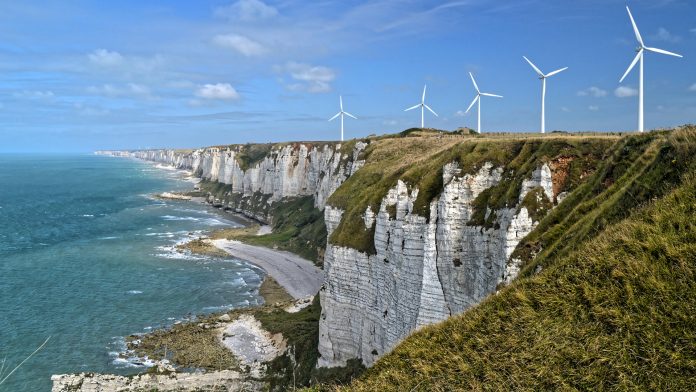Developments in renewable energy policy from the European Union have prompted France to innovate its renewable energy strategy, with the aims of becoming Europe’s leaders in green energy.
New legislation outlined in the European Green deal will require member states to achieve a 55% reduction of the net greenhouse gas emissions by 2030 compared to statistics from 1990, with objectives of achieving a carbon-neutral Europe by 2050.
The 2030 target implemented by the EU Emissions Trading System demands a 40% decrease in greenhouse gas emissions, a minimum 32% share for renewable energy across the continent, and an energy efficiency improvement of 32.5%. Furthermore, June’s imminent renewable energy directive from the EU will outline the bloc’s objective of renewable energy sources equating for 38 to 40% of Europe’s energy mix, far surpassing its 2009 goal of 23%.
What does this mean for France?
Currently, the landscape of renewable energy in France is trailing some of its European neighbours, such as Sweden, Finland, and Denmark, with France missing the mark of the bloc’s 23% energy mix target in 2020, attaining 19.1%. However, novel directives planned by the French government are looking to turn its renewable energy fortunes around, making this sleeping giant of an energy producer a European superpower of renewable energy.
The country is already leading the way as a global superpower in other facets of energy production, with its nuclear power production being the most considerable in Europe, surpassed globally only by the US, signifying that if the country can spearhead one sector of energy, then its industry-leading strategies can also be implemented into creating a renewable energy revolution.
Nuclear power has been France’s most prominent energy source since the 1970s, with a 2017 study indicating the following proportions of the country’s energy mix:
- 6% Nuclear;
- 1% Hydro;
- 7% gas;
- 5% wind;
- 8% coal;
- 7% Solar;
- 7% Bioenergy’s; and
- 7% Fuel
Investing in the future of renewable energy
It is strikingly apparent that there is a significant disparity in the distribution of France’s energy sources; however, to reinvent its energy structure and achieve the EU’s mandates, the French government announced that it would be devoting €30bn towards green energy projects as part of its COVID-19 recovery plan. The project is looking to formulate a hydrogen economy for the country, with €2bn invested by 2020, and the inception of a hydrogen sector not only boosting France’s output of renewable energy but also creating up to 100,000 jobs in the process.
Jean Castex, the French Prime Minister, said: “€30bn will be invested across four key sectors – energy retrofits for buildings, transport, agricultural transition, and energy –to make France’s economy the first major low-carbon economy in Europe.”
Additionally, the industrialisation of materials and fuel cells in the country will be realised to support the development of hydrogen vehicles, with electrolysers utilised to lower the emissions of industrial sites, which may make huge inroads into becoming the first low-carbon economy in Europe.
Unlike the national boom of nuclear power, France will not be putting all their energy eggs in one hydrogen power basket, with significant investments also made into wind and solar projects, which can more efficiently distribute its power needs throughout its energy mix. As recently as October 2020, Barbara Pompili, the French Minister of the Ecological Transition, announced plans for wind and solar photovoltaic projects that will equate to 600 megawatts of power, with almost 100 sites, 45 of which will be ground mounted. A further 31 self-consumption solar projects were also scheduled, with the overall capacity of the projects generating around one terawatt of electricity annually, enough to power almost 200,000 households.
The room for balance
Perhaps the most promising thing for France is that the impending EU legislation states that energy targets will be calculated as an average across the continent instead of per country, meaning that their already considerable nuclear production can allow for alternative forms of renewable energy to be focused elsewhere, with the primary objective being to combat emissions. Either way, France is taking the necessary steps towards not only competing with the rest of Europe but leading it.








